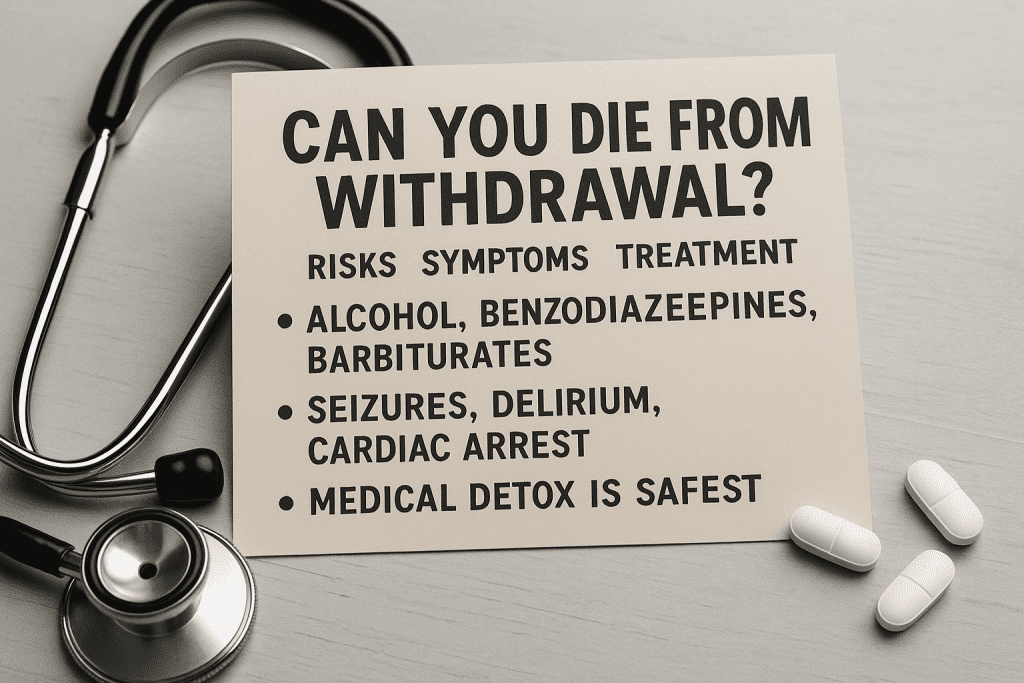Last Updated on October 9, 2025
Table of Contents
Withdrawal occurs when someone who has developed physical dependence on drugs or alcohol suddenly reduces or stops use. For many substances, withdrawal is unpleasant but not life-threatening. However, in certain cases, withdrawal can be dangerous or even deadly if not managed properly.
This raises an important question: can withdrawal kill you? The short answer is yes—but only with specific substances and under certain conditions. Knowing which types of withdrawal are potentially fatal, recognizing warning signs, and seeking medical care can save lives.
What Is Withdrawal?
When drugs or alcohol are used repeatedly, the brain and body adjust to their presence. Over time, dependence develops, meaning the body needs the substance to function “normally.”
When the substance is suddenly removed, the nervous system reacts violently, producing withdrawal symptoms. These symptoms can range from mild anxiety and sweating to seizures and cardiac arrest—depending on the substance and the individual’s health.
Can Withdrawal Kill You?
Yes, withdrawal can be fatal in some cases. Not all substances cause life-threatening withdrawal, but certain categories—like alcohol, benzodiazepines, and barbiturates—pose serious risks.
Both questions—“can withdrawal kill you” and “can you die from withdrawal”—have the same answer: it depends on the substance and the severity of dependence.
Substances With Life-Threatening Withdrawal
Alcohol
Heavy, long-term drinking can lead to a dangerous condition known as Delirium Tremens (DTs) during withdrawal.
DTs involve seizures, hallucinations, severe confusion, rapid heartbeat, and high blood pressure.
Without treatment, alcohol withdrawal can result in cardiac arrest, stroke, or death.
According to the National Institute on Alcohol Abuse and Alcoholism (NIAAA), untreated DTs carry a mortality rate of 5–15%
Don’t attempt alcohol withdrawal alone—our alcohol detox center in Austin provides round‑the‑clock medical protection.
Benzodiazepines (e.g., Xanax, Valium, Ativan)
Often prescribed for anxiety or insomnia, benzodiazepines slow brain activity.
Stopping suddenly after heavy use can cause life-threatening seizures, hallucinations, and severe panic attacks.
Medical detox with tapering is necessary to prevent complications.
Barbiturates
Once widely prescribed for sleep disorders, these drugs can cause intense dependence.
Sudden withdrawal may lead to seizures, delirium, and cardiovascular collapse.
Freedom Starts Here. Take Back Your Life Today.
Same-Day Admissions in Austin Available.
Substances That Cause Severe but Usually Nonfatal Withdrawal
While not usually deadly, these withdrawals can still be extremely distressing and may require medical supervision:
Opioids (heroin, oxycodone, fentanyl): Flu-like symptoms, muscle pain, nausea, anxiety, insomnia. Extremely uncomfortable but rarely fatal on their own. The greater danger comes from relapse and overdose after detox.
Stimulants (cocaine, methamphetamine): Fatigue, depression, suicidal thoughts, strong cravings. Death is rare but suicide risk is elevated.
Cannabis: Irritability, insomnia, appetite loss, anxiety. Not life-threatening but can make recovery difficult.
Why Withdrawal Can Be Deadly
Seizures: Seen in alcohol and benzodiazepine withdrawal, seizures can result in brain injury or death.
Dehydration and electrolyte imbalance: Severe vomiting and sweating can cause dangerous shifts in body chemistry.
Cardiac complications: Rapid heart rate and blood pressure spikes increase stroke and heart attack risk.
Delirium Tremens (DTs): The most serious alcohol withdrawal complication, often fatal without medical care.
Medical Detox: The Safe Way to Manage Withdrawal
Attempting to detox “cold turkey” without medical supervision is the greatest risk factor for fatal withdrawal. Medical detox provides:
24/7 monitoring of vital signs
Medications to ease symptoms and prevent seizures
IV fluids and nutrition to restore balance
Safe tapering to gradually reduce dependence
Detox facilities, like those offered by Nova Recovery Center in Texas, specialize in managing withdrawal safely.
Can You Die From Withdrawal at Home?
Yes, attempting detox at home can be deadly. Even if symptoms start mild, they can escalate rapidly. Alcohol and benzodiazepine withdrawal, in particular, can turn fatal within hours or days.
That’s why professionals strongly recommend entering a supervised detox program rather than attempting home withdrawal.
Long-Term Recovery After Withdrawal
Detox is only the first step. To maintain sobriety and reduce relapse risk, individuals need long-term treatment that includes:
Cognitive Behavioral Therapy (CBT)
Peer support groups (AA, NA, SMART Recovery)
Relapse prevention planning
Ongoing counseling and aftercare
FAQ: Withdrawal and Fatal Risks
Can withdrawal kill you?
Yes, withdrawal from alcohol, benzodiazepines, and barbiturates can be deadly without medical treatment.
Can you die from withdrawal?
Yes. In severe cases, withdrawal can cause seizures, delirium, heart complications, or death. Professional detox is the safest way to recover.
Which withdrawals are most dangerous?
Alcohol and benzodiazepine withdrawal are considered the most life-threatening. Barbiturate withdrawal is also dangerous.
Is opioid withdrawal deadly?
Opioid withdrawal is rarely fatal by itself, but it can cause severe sickness and increase the risk of relapse and overdose.
Can withdrawal symptoms last long?
Yes. Some symptoms last days (acute withdrawal), while others—like anxiety, insomnia, and cravings—can persist for weeks or months (post-acute withdrawal syndrome).
Should you detox at home?
No. Medical supervision is strongly recommended for safety. Home detox increases the risk of fatal complications.
So, can withdrawal kill you? The answer is yes—especially with alcohol, benzodiazepines, or barbiturates. Even when not deadly, withdrawal can be extremely painful and risky without medical care.
If you or someone you know is struggling with dependence, don’t attempt detox alone. Professional treatment centers provide safe medical detox and long-term recovery programs that can save lives.
Recovery is possible, and help is available.
